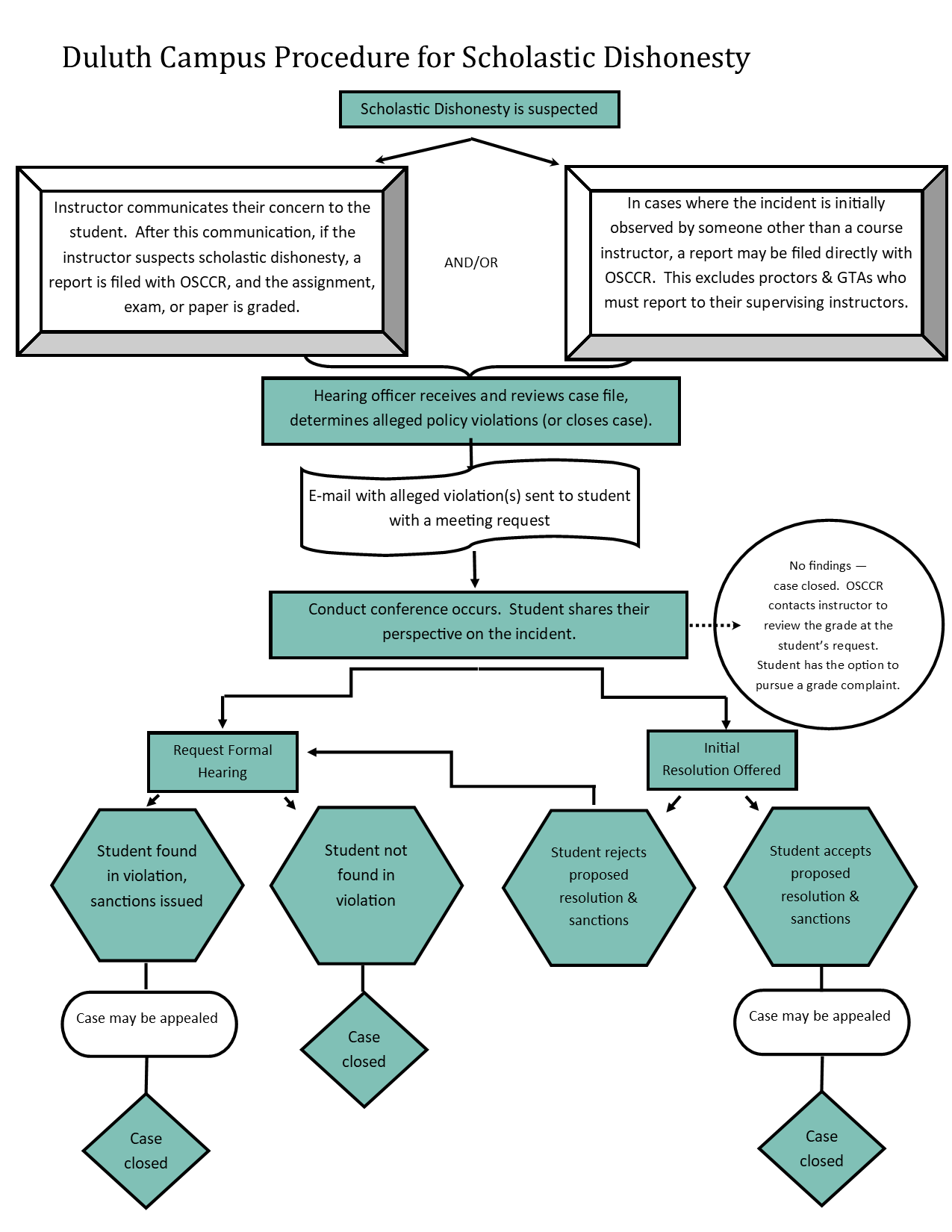Procedure
The procedure is conducted by officials who do not have a conflict of interest or bias against the parties involved. The Student Conduct process is comprised of the following three levels, as necessary: 1) Conduct Conference/Initial Resolution, 2) Formal Hearing, 3) Appeal. OSCCR encourages informal resolution of student conduct cases to resolve after the Conduct Conference with the Initial Resolution, and many cases do not reach the levels of Formal Hearing or Appeal. At every level, the standard of review used for decision-making is Preponderance of the Evidence.

- Scholastic Dishonesty is suspected:
- In cases where the instructor suspects scholastic dishonesty, the instructor must contact the student within ten (10) business days of becoming aware of the concern. The instructor shares the concern with the student and invites them to share their perspective. If the instructor believes scholastic dishonesty occurred, the instructor files a report that provides all relevant details with OSCCR. The faculty member also grades the student’s work in light of the reported concern. OSCCR will invite the instructor to participate in student conduct proceedings as needed, which may include requests for i) additional information and/or ii) participation in formal hearings and appeals.
- In cases where someone other than the instructor suspects scholastic dishonesty, a report may be made directly to OSCCR.
- OSCCR contacts the student (Respondent) via UMD email with fair and timely notice of the allegations, and a meeting request for a Conduct Conference. The Conduct Educator will utilize the procedures described in the OSCCR: Conduct Conference Guide.
- During the Conduct Conference, the incident report and the rights and responsibilities of the respondent are reviewed. Questions regarding the conduct process are answered. Failure to attend a conduct conference may result in a) a hold being placed on the respondent’s student account, and/or b) a decision rendered in the respondent’s absence.
- If the Conduct Educator finds that is not responsible for prohibited behavior under the Student Conduct Code, the concerns will be referred back to the instructor for grade review at the student’s request. If the student is not satisfied with the grade review, they may pursue a grade complaint.
- If the Conduct Educator determines the Respondent is responsible for prohibited behavior under the Student Conduct Code an Initial Resolution will be offered. The Respondent may then:
- Accept the initial resolution and complete the outcomes as assigned. A student may take up to five calendar days to accept (or reject) the initial resolution offered in the administrative meeting. OR
- Reject initial resolution and invoke their right to a Formal Hearing with the Student Hearing Panel.
- NOTE: At the expiration of five calendar days, any lack of response will be deemed an acceptance of the initial resolution.
- If the student invokes their right to a Formal Hearing, The Student Hearing Panel will utilize the procedures described in the OSCCR: Formal Hearing Guide and make a determination of responsibility, and if appropriate will assign outcomes. These decisions are separate from the Initial Resolution offered and may be the same or may be different, and outcomes, if applicable, may be more or less stringent based on the panel’s determination. If the panel finds the student is not responsible for prohibited behavior under the Student Conduct Code occurred, the concerns will be referred back to the instructor for grade review at the student’s request. If the student is not satisfied with the grade review, they may pursue a grade complaint.
- The Respondent has the right to appeal either the Initial Resolution or the Formal Hearing decision. Appeals must be filed on at least one of the following grounds:
- New information became available that was not known at the time of the hearing;
- A major procedural error was made, or;
- The outcome assigned was inconsistent with current outcomes for similar prohibited behavior.
- Appeals must be made in writing within 5 weekdays of the date of the decision letter using the Appeal Petition.
- The Student Appeals Panel will convene to review the appeal utilizing the procedures described in the OSCCR: Appeals Guide. The panel may accept, modify, or reject the decision of the hearing body, or return the matter for further proceedings. The decision of the Student Appeals Panel is final. If the Student Appeals Panel finds that no violation of the Student Conduct Code occurred, the concerns will be referred back to the instructor for grade review at the student’s request. If the student is not satisfied with the grade review, they may pursue a grade complaint.
- Once any outcomes associated with a final case decision are complete, the case is closed.